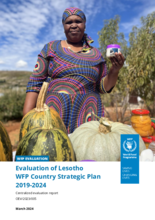Lesotho
- 56 percent
- of households cannot afford a nutritious diet
- 699,000
- food insecure people
- 2 million
- population
Landlocked within South Africa, the Kingdom of Lesotho has a population of over 2 million. Despite some economic growth, Lesotho struggles to address rural poverty and foster inclusive social development. The economy relies heavily on agriculture, which is the main income source for rural residents.
The country faces a triple burden of malnutrition – undernutrition, overnutrition and micronutrient deficiencies. Stunting (impaired development due to malnutrition) affects 36 percent of children under 5.
Nearly half of the population live below the food-poverty line, with over 80 percent of the poor in rural areas.
One third of the population experiences acute food insecurity and needs humanitarian assistance. Poor households lack resilience against economic shocks, have no savings or access to credit, and are trapped in a cycle of low investment, productivity and income.
The World Food Programme focuses on enhancing climate-resilient food systems, human capital development, social protection, and emergency preparedness and response, with a focus on women, young people, and other vulnerable groups.
What the World Food Programme is doing in Lesotho
-
Emergency preparedness and response
-
WFP supports the Government with targeted and inclusive early-warning systems to promptly anticipate and respond to unpredictable climate events. We also focus on scaling up anticipatory action ahead of shocks while providing food and cash assistance to people severely food-insecure people during emergencies.
-
School meals
-
WFP supports the national school feeding programme by providing meals to over 50,000 pre-primary children across ten districts. In two southern districts, WFP runs a home-grown school feeding programme involving smallholder farmers, aggregators and retailers, to supply locally produced food to schools.
-
Nutrition
-
WFP provides financial and technical support to the Government and other partners to implement and monitor nutrition programmes, including for children during the first 1,000 days of life and for people living with HIV/AIDS.
-
Resilience building
-
Working with the Government, WFP coordinates programmes that support diversified livelihoods and increase incomes, particularly among young people and smallholder farmers. Households participate in seasonal activities that pair Indigenous knowledge with innovative technologies to support sustainable livelihoods, while addressing ecosystem degradation. These activities include asset creation/rehabilitation, soil and water conservation, landscape restoration, watershed management and skills training.
-
Smallholder-farmer support
-
WFP provides technical guidance and training to smallholder farmers to improve food production, quality, processing and market access, both locally and internationally. Additionally, WFP supports the government’s efforts to improve decentralized food aggregation and storage facilities that reduce post-harvest losses for farmers.
Lesotho news releases
Go to pagePartners and donors
Find out more about the state of food security in Lesotho
Visit the food security analysis pageOperations in Lesotho
Contacts
Office
WFP House,11 United Nations Road, Opposite Maseru Club, P.O. Box 301, Maseru, Lesotho
Maseru
Lesotho





